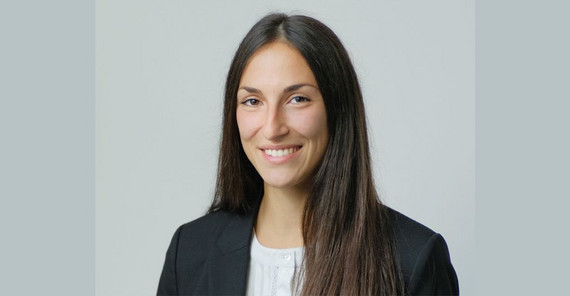The majority of all chemical industrial processes are catalytic, and the impact of catalysis on the global economy and environment is therefore considerable, especially in the pharmaceutical and agrochemical industries. Molecules that can be represented as an image and a mirror image, so-called chiral compounds, play a significant role in these processes. Recognition of these molecules by the human body is of great importance for drug production. The relevance of catalytic and chiral processes was once more strengthened by this year's Nobel Prize in chemistry, which was given for the development of asymmetric organocatalysis. Porous chiral materials have larger active surfaces, and can make the processes for obtaining chiral compounds more efficient. Therefore, commercial catalysts usually consist of metal nanoparticles dispersed on nanoporous oxide or carbon material.
Milena Perovic's PhD thesis on "Functionalization of Nanoporous Carbon Materials for Chiral Separation and Heterogeneous Oxidation Catalysis" makes an important contribution to our knowledge of carbons for an exotic new application of chiral separation and a traditional catalytic application. She published the results of her work as first author in five leading journals in chemistry in 2020 and 2021.
Milena Perovic studied chemistry at the University of Novi Sad, Serbia, and at Freie Universität Berlin. She then completed her PhD at the Max Planck Institute of Colloids and Interfaces and the University of Potsdam under the supervision of Prof. Markus Antonietti and Prof. Martin Oschatz. Since April 2021, she has been working as researcher at the Institute for Particle Technology at the Technische Universität Braunschweig in the division of battery process engineering.
The Publication Prize of the Leibniz Kolleg Potsdam is awarded to current or former doctoral students of the Faculty of Science of the University of Potsdam. They receive the award for significant scientific achievements in Potsdam that have been published in recognized journals.
Publications:
Perovic, M., Aloni, S.S., Zhang, W., Mastai, Y., Antonietti, M., and Oschatz, M.: Toward Efficient Synthesis of Porous All-Carbon-Based Nanocomposites for Enantiospecific Separation, ACS Applied Materials & Interfaces 2021 13 (20), 24228-24237, https://doi.org/10.1021/acsami.1c02673
Perovic, M., Zeininger, L., Oschatz, M.: Immobilization of gold-on-carbon catalysts onto perfluorocarbon emulsion droplets to promote oxygen delivery in aqueous phase d-glucose oxidation. ChemCatChem 2021, 13, 1, 196 – 201. https://doi.org/10.1002/cctc.202001590
Perovic, M., Qin, Q., and Oschatz, M.: From Molecular Precursors to Nanoparticles—Tailoring the Adsorption Properties of Porous Carbon Materials by Controlled Chemical Functionalization. Advanced Functional Materials 2020, 1908371. https://doi.org/10.1002/adfm.201908371
Perovic, M., et al. Influence of Local Environments in Pores of Different Size on the Catalytic Liquid-Phase Oxidation of d-Glucose by Au Nanoparticles Supported on Nanoporous Carbon. ACS Applied Nano Materials 2020, 3, 8, 7695 – 7703. https://doi.org/10.1021/acsanm.0c01299
Perovic, M., et al.: Mesoporous Carbon Materials with Enantioselective Surface Obtained by Nanocasting for Selective Adsorption of Chiral Molecules From Solution and the Gas Phase. CARBON 2020, 170, 550 – 557. https://doi.org/10.1016/j.carbon.2020.08.010
Contact:
Dr. Barbara Schneider, Mathematisch-Naturwissenschaftliche Fakultät
Phone: +49 331 977-2960
E-Mail: leibnizuuni-potsdampde
Internet: www.leibnizkollegpotsdam.de
Medieninformation 15-10-2021 / Nr. 093

